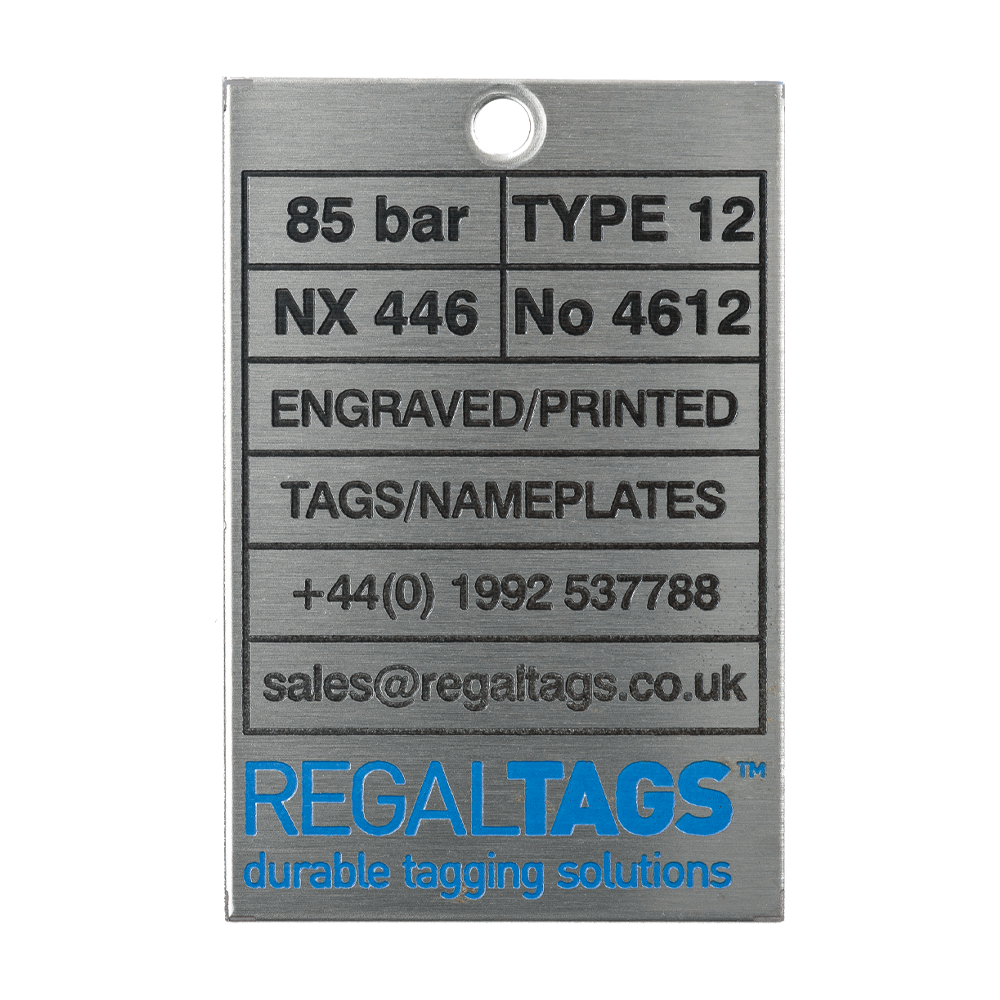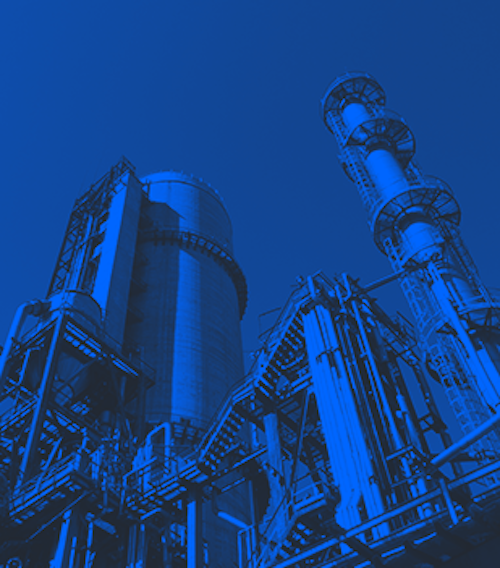Metal tags vs. other materials: What makes metal stand out?
Explore how metal tags compare to plastic and synthetic materials across durability, temperature resistance, and long-term performance. Discover why metal remains the top choice for harsh industrial environments and when high-grade plastics might be the right alternative.
When it comes to industrial labelling, choosing the right tag material is more than just a matter of preference, it is a critical decision that impacts safety, compliance, durability and cost-efficiency. From plastic and paper to synthetic composites, there are several options available, each suited to different conditions, but metal tags can provide additional durability in the most extreme conditions.
In this blog, we will explore how metal tags compare to other materials, highlighting what makes them stand out in terms of strength, longevity and adaptability. Whether you are working in manufacturing, oil and gas or construction, understanding the differences can help you make a more informed choice.
Understanding tag materials
Before deciding which tag is right for your application, it is important to understand the variety of materials available. Tags serve as essential tools for identification, tracking, safety and compliance across a range of industries.
The material you choose affects how well a tag performs in specific environments, especially when exposed to heat, moisture, chemicals or physical wear.
Common tag materials include:
- Plastic: Modern engineered plastics, such as Prism Polypropylene, offer excellent durability, moisture resistance and even UV stability. When specified correctly, plastic tags can perform reliably outdoors and in many industrial settings. However, low-grade plastics like PVC may not hold up to extreme conditions.
- Synthetic materials: These offer better moisture resistance and are used in environments with moderate wear, though they still lack the toughness of more rigid materials.
- Metal: Known for their superior durability and resistance to abrasion, heat and chemicals, metal tags are ideal for high-demand and outdoor settings. They can be laser engraved, etched or stamped for long-lasting legibility.
Each material serves a purpose, but when longevity, resilience and readability matter most, especially in safety-critical or industrial applications, metal often proves to be the most reliable choice.

Why metal tags stand the test of time
Metal tags are trusted in the toughest environments. Their exceptional durability, resistance to wear and ability to maintain legibility over time make them to go-to choice for industries that demand long-term reliability.
Unlike materials that fade, warp or degrade under pressure, metal tags can withstand extreme conditions such as:
- High temperatures
- Exposure to chemicals
- Harsh weather and UV radiation
- Mechanical abrasion and impact
Depending on the type of metal used, such as stainless steel, aluminium or brass, these tags offer varying levels of corrosion resistance, strength and visual clarity. For example, stainless steel tags are ideal for marine or chemical environments, while aluminium tags are lightweight yet extremely resilient and well-suited for electrical applications.
Because of their longevity, metal tags reduce the need for frequent replacements, helping businesses save time and costs over the long run.
Whether you are marking machinery, tracking assets or labelling hazardous areas, metal tags offer a level of permanence and dependability that other materials simply can’t match.

Metal vs. plastic tags: Key differences
While both metal and plastic tags are commonly used across industries, their performance varies significantly depending on the environment and application. Understanding the key differences between these two materials can help ensure your tagging solution meets long-term needs without compromising safety, compliance or clarity.
High temperature performance
- Metal tags excel in high-heat environments, maintaining their integrity and legibility even when exposed to extreme temperatures. This makes them ideal for industrial settings.
- Plastic tags, if high-grade, can tolerate elevated temperatures, but not to the same extent as metal. Choosing the right plastic is essential to maintain legibility and performance under heat.
Longer-term durability
- Metal tags are engineered for longevity and can remain intact and readable for decades, even in harsh conditions. Their resistance to corrosion and weathering makes them well-suited for long-term asset identification.
- Plastic tags, when made from Prism Polypropylene, offer a respectable lifespan and can perform reliably in most applications. They may show quicker wear in highly abrasive environments compared to metal tags.
Resistance to movement and abrasion
- Metal tags stand up to repeated contact, vibration and abrasion without losing readability. They are the preferred choice for machinery, moving parts or any application involving physical wear.
- Plastic tags are more vulnerable to scratching, scuffing and physical damage in applications where there is a lot of movement. This can compromise their clarity and usefulness over time.
While high-spec plastics are tough, metal tags are still the go-to where constant friction, impact or machine contact is expected.
Environmental resistance
- Metal tags perform exceptionally well in extreme outdoor, marine and industrial environments.
- Plastic tags are often the preferred choice for most applications, if made from modern plastic such as our Prism Polypropylene.
Appearance and customisation
- Metal tags allow for deeper, more permanent marking methods such as laser engraving.
- Plastic tags can be printed or engraved but may lose clarity over time.
Cost
- Plastic tags are typically cheaper upfront, making them a cost-effective solution for short-term or low-risk applications.
- Metal tags, while more expensive initially, offer greater long-term value due to reduced maintenance and replacement needs.
Ultimately, if your application involves exposure to heat, chemicals, moisture or wear, metal tags provide a more reliable, long-lasting solution compared to plastic alternatives.

Industries that rely on metal tags
Metal tags are the preferred choice in industries where durability, traceability and compliance are non-negotiable. These sectors operate in demanding environments where equipment, assets and components must remain clearly identified over long periods.
- Oil and gas: From offshore platforms to drilling sites, metal tags withstand high heat, pressure and corrosive chemicals. This makes them ideal for pipe labelling, equipment ID and safety signage.
- Refineries and pipelines: In environments with volatile substances and strict safety regulations, metal tags provide long-lasting identification that resists abrasion and chemical damage.
- Water: Exposure to moisture, UV light and varying temperatures requires non-corrosive, waterproof tags for valves, pumps and infrastructure.
- Energy: Power generation, transmission and utility facilities rely on metal tags for asset management, cable marking and compliance labelling.
- Chemical manufacturing: Facilities dealing with hazardous materials need tags that can resist aggressive chemicals, steam and mechanical wear.
In some applications within these industries, high-performance plastic tags may still be suitable, for example, where flexibility or lightweight materials are beneficial. For maxim abrasion resistance and permanence, metal remains a superior choice.
Advantages of using metal tags for compliance and safety
In industries where safety and regulatory compliance are critical, clear and durable identification is more than a convenience, it is a legal and operational requirement.
Metal tags provide a reliable way to meet these standards by offering long-lasting visibility and resistance to harsh conditions.
Here are key advantages of using metal tags for compliance and safety:
- Long-term legibility
- Regulatory compliance
- Resistance to environmental hazards
- Fire and heat safety
- Tamper resistance
By choosing metal tags, businesses can enhance both worker safety and operational reliability, while staying compliant with industry standards and best practices.
Why REGALTAG recommends metal for harsh environments
At REGALTAG, we specialise in supplying tagging solutions built for the world’s toughest environments. We recommend selecting the tag material that best fits your environment.
Our Prism Polypropylene plastic tags offer excellent performance in most industrial settings, while our metal tags are ideal for extreme or high-risk conditions where long-term legibility is non-negotiable.
Choosing metal tags from REGALTAG means equipping your operations with identification solutions that are just as tough, reliable and tailored as the environments you work in.
Subscribe
Join 18,000+ others receiving our monthly updates. Free Tag insights delivered straight to your inbox.






